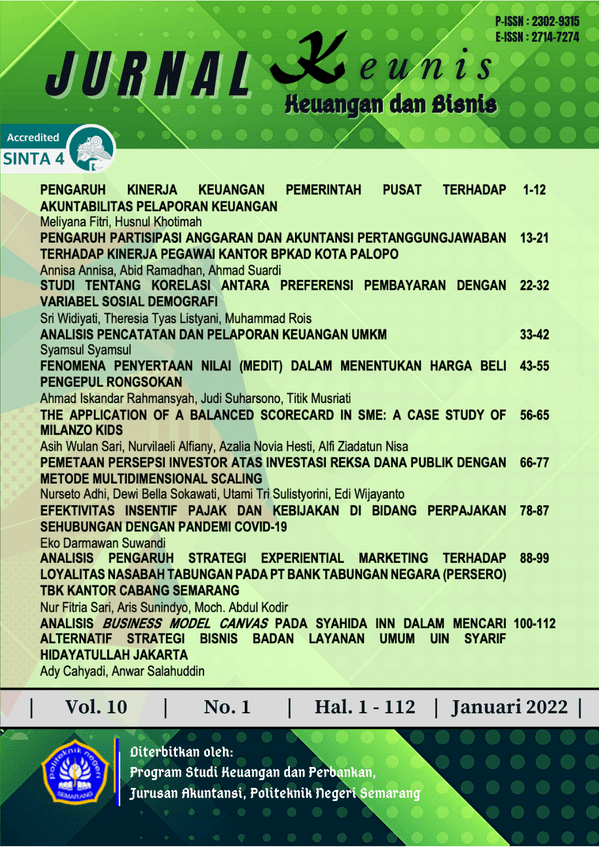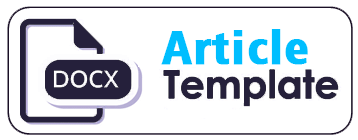EFEKTIVITAS INSENTIF PAJAK DAN KEBIJAKAN DI BIDANG PERPAJAKAN SEHUBUNGAN DENGAN PANDEMI COVID-19
DOI:
https://doi.org/10.32497/keunis.v10i1.3175Keywords:
Tax incentives, Covid 19 Pandemic, State Revenues, Income Tax, Pandemi Covid 19Abstract
This research aims to analyze the effectiveness of tax incentives and policies in the field of taxation in connection with the Covid-19 pandemic. The research findings show that the impact of the government's tax policy has not been said to be effective but has shown a positive impact in the form of an increase in revenue from domestic tax components in 2021 compared to 2020, namely Income Tax increased by 2.0%, Value Added Tax and Sales Tax on Goods. Luxury rose 2.2%, Land and Building Tax increased 10.3%, Excise increased 4.5%, and Other Taxes increased 66.1%. The impact of taxation policies can also be seen from the increase in revenue from the international trade tax component in 2021 compared to 2020, namely state revenues from import duties which increased by 4.2% and export taxes increased by 8.1%.
References
Arvita, R., & Sawarjuwono, T. (2020). Etika Profesional Konsultan Pajak Dalam Melaksanakan Perannya Sebagai Mitra Wajib Pajak Dan Pemerintah. EJurnal Akuntansi, 30(1), 88-100.
Cooper, H. (2015). Research synthesis and meta-analysis: A step-by-step approach (Vol. 2). Sage publications.
Eva, D., Silalahi, S., & Kunci, K. (2020). Strategi Kebijakan Fiskal Pemerintah Indonesia dalam Menghadapi Dampak Pandemi COVID-19. Jurnal Ekonomi & Ekonomi Syariah.
Hadiwardoyo, W. (2020). Kerugian ekonomi nasional akibat pandemi Covid-19. Baskara: Journal of Business and Entrepreneurship, 2(2), 83-92.
Harun, I., Diana, N., & Mawardi, M. C. (2019). Analisis Penerapan Peraturan Pemerintah No. 23 Tahun 2018 Bagi UMKM di Kota Malang. Jurnal Ilmiah Riset Akuntansi, 8(10).
Hidayat, K. (2021). Pemulihan ekonomi Indonesia lambat, apa yang harus dilakukan?, https://nasional.kontan.co.id/news/pemulihan-ekonomi-indonesia-lambat-apa-yang-harus-dilakukan
Junaedi, D., & Salistia, F. (2020). DAMPAK PANDEMI COVID-19 TERHADAP PERTUMBUHAN EKONOMI NEGARA-NEGARA TERDAMPAK. Simposium Nasional Keuangan Negara, 2(1), 995-1013.
Ilyas, W. B dan Burton, R. (2013). Hukum Pajak, Teori, Analisis, dan Perkembangannya, Edisi 6. Jakarta: Salemba Empat.
Latief, S., Zakaria, J., & Mapparenta, M. (2020). Pengaruh Kepercayaan Kepada Pemerintah, Kebijakan Insentif Pajak dan Manfaat Pajak Terhadap Kepatuhan Wajib Pajak. CESJ: Center Of Economic Students Journal, 3(3), 270-289.
Lubis, R. H. (2018). Pajak Penghasilan, Teori, Kasus dan Aplikasi. Yogyakarta: Andi
Mardiasmo. (2018). Perpajakan Edisi Terbaru. Yogyakarta: Andi
Maryanti, S., Netrawati, I. G. A. O., & Nuada, I. W. (2020). Pandemi COVID-19 dan implikasinya pada perekonomian NTB. Media Bina Ilmiah, 14(11), 3497-3508.
Mudara, N. A. H. P. (2021). KEBIJAKAN FISKAL DALAM PANDEMI COVID-19: DAMPAK DAN TANTANGAN PENERIMAAN PAJAK DI KPP WAJIB PAJAK BESAR DUA. Scientax, 2(2), 248-264.
Nasution, D. A. D., Erlina, E., & Muda, I. (2020). Dampak pandemi COVID-19 terhadap perekonomian Indonesia. Jurnal Benefita, 5(2), 212. https://doi.org/10.22216/jbe.v5i2.5313
Resmi, S. (2017). Perpajakan, Teori dan Kasus, Edisi 10, Buku 1. Jakarta: Salemba Empat
Sayekti, I. M. S. (2020). Mengkaji Insentif Pajak atas Covid-19, https://analisis.kontan.co.id/news/mengkaji-insentif-pajak-atas-covid-19opini
Silalahi, D. E., & Ginting, R. R. (2020). Strategi Kebijakan Fiskal Pemerintah Indonesia Untuk Mengatur Penerimaan dan Pengeluaran Negara Dalam Menghadapi Pandemi Covid-19. Jesya (Jurnal Ekonomi dan Ekonomi Syariah), 3(2), 156-167.
Suandy, E., (2006). Perencanaan Pajak, Salemba Empat, Jakarta
Sukmadinata, N.S. (2009). Metode Penelitian Pendidikan. Bandung: Rosdakarya.
Winardi, (2011). Kamus Ekonomi, Bandung: Mandar Maju.
https://satudata.kemendag.go.id/
Kelemahan Insentif Pajak diakses dari https://news.detik.com/kolom/d-5072305/kelemahan-insentif-pajak.
Perpanjangan Insentif Covid-19, diakses dari https://pajak101.com/perpanjangan-insentif-covid-19/
Worldmeters, 2020. “Coronavirus Cases” diakses dari https://www.worldometers.info/coronavirus/
Downloads
Published
How to Cite
Issue
Section
License
KEUNIS is licensed under a Creative Commons Attribution-ShareAlike 4.0 International License.
Authors who publish with this journal agree to the following terms:
- Authors retain copyright and grant the journal right of first publication with the work simultaneously licensed under a Creative Commons Attribution-ShareAlike 4.0 International License that allows others to share the work with an acknowledgement of the work's authorship and initial publication in this journal.
- Authors are able to enter into separate, additional contractual arrangements for the non-exclusive distribution of the journal's published version of the work (e.g., post it to an institutional repository or publish it in a book), with an acknowledgement of its initial publication in this journal.
- Authors are permitted and encouraged to post their work online (e.g., in institutional repositories or on their website) prior to and during the submission process, as it can lead to productive exchanges, as well as earlier and greater citation of published work (See The Effect of Open Access).






